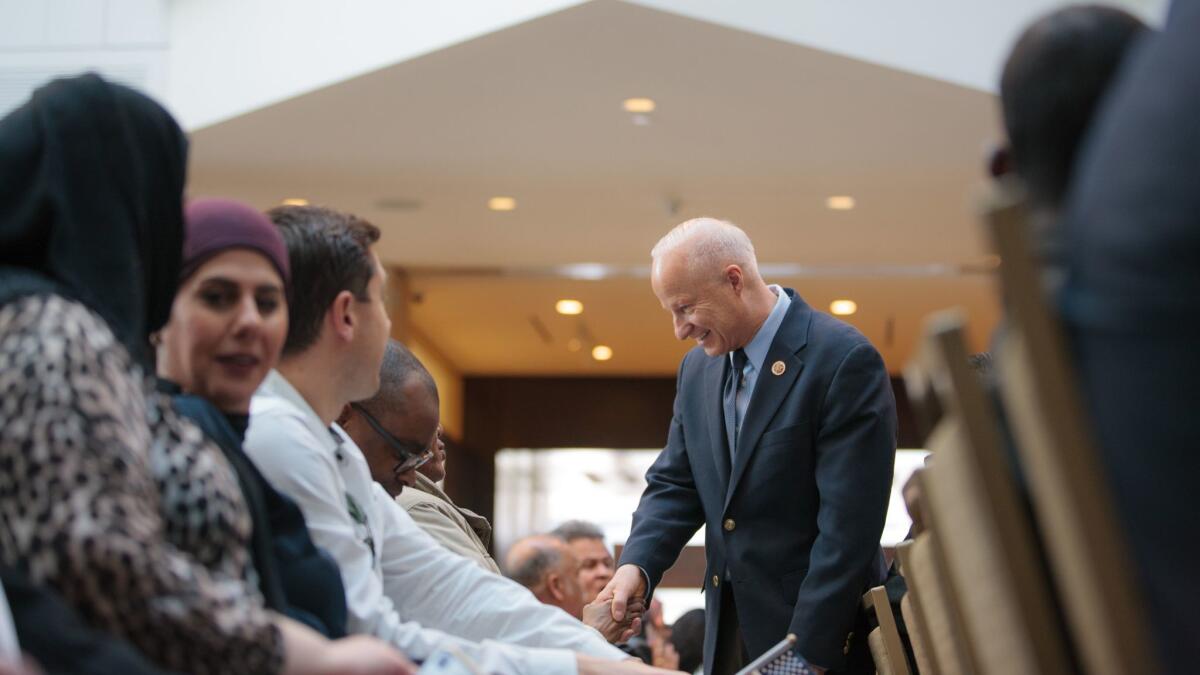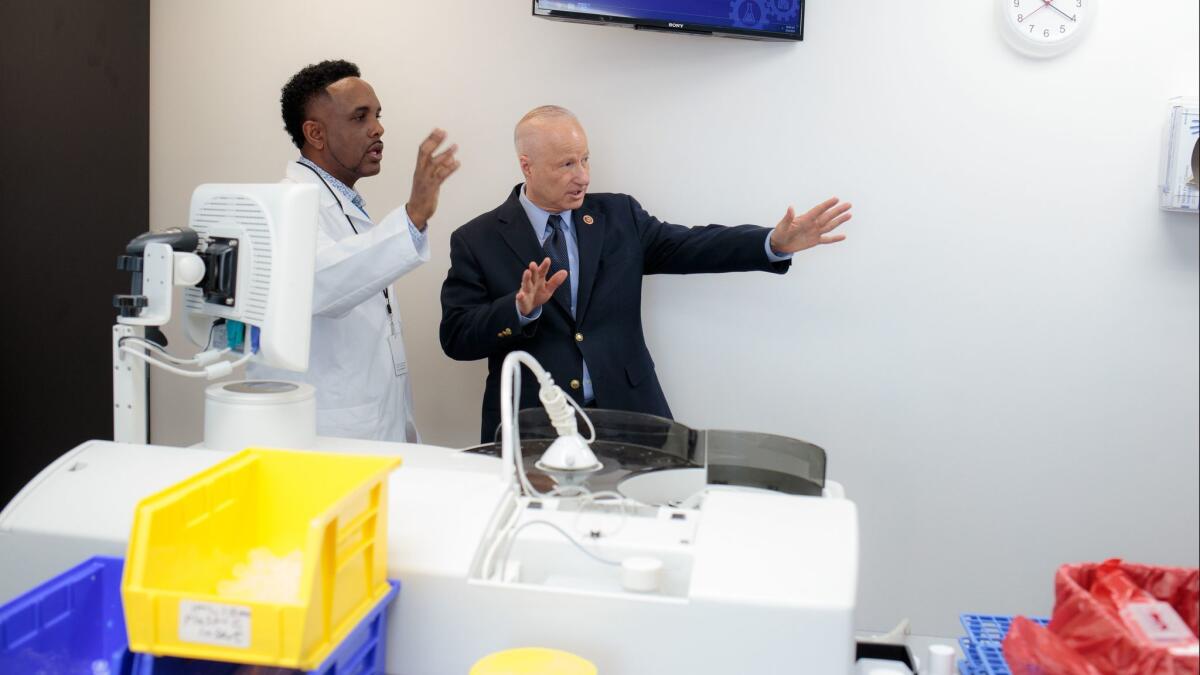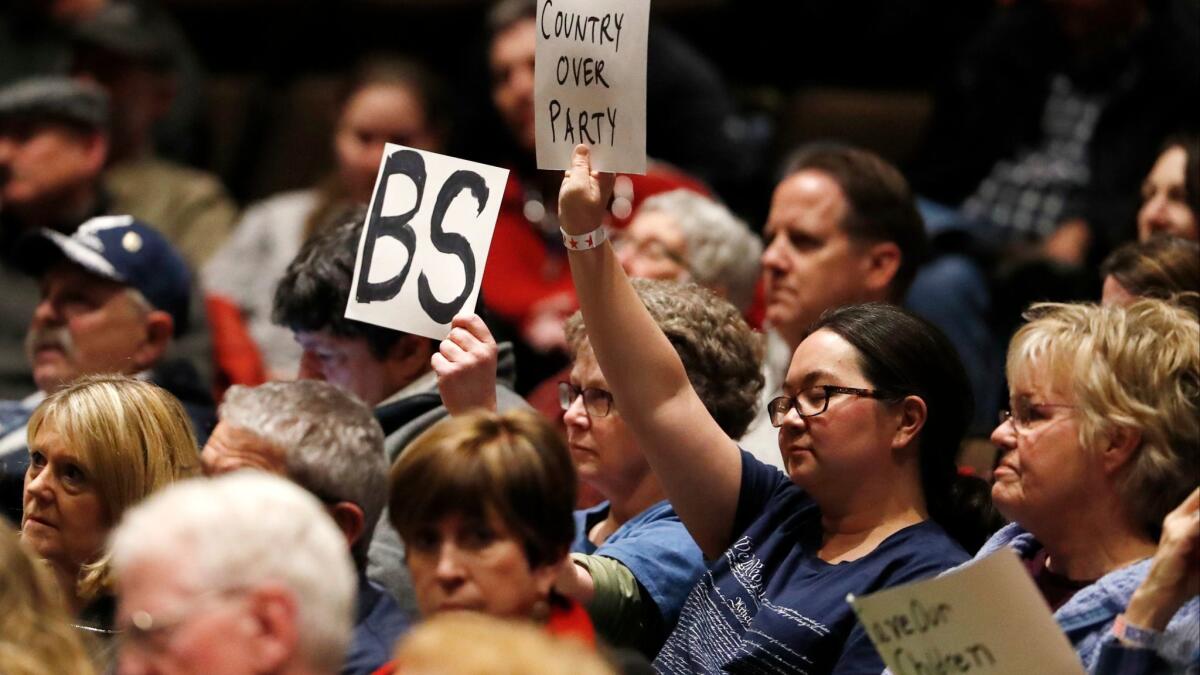How one vulnerable Republican is adapting as he tries to survive anti-Trump wave

- Share via
Reporting from Aurora, Colo. — When Mike Coffman was growing up in Aurora, it was a small white military town on the outskirts of Denver. In the half a century since then, wave after wave of immigrants and refugees have transformed it into a vibrant, racially mixed suburb.
Coffman, a pro-gun and antiabortion Republican congressman, managed to defy the odds and win election even as his district backed Democrats Barack Obama and Hillary Clinton for president.
How did he pull it off?
He took Spanish lessons from a Colombian tutor. He became a regular at Friday prayers at a Denver mosque. He joined Saturday gatherings at a Chinese school. For his next visit to a Sikh temple, Coffman, 63, wants to grow a beard so he’ll look presentable in a turban.
“Without the beard I kind of look like an ugly old woman,” he said on the way to a naturalization ceremony in Denver for new U.S. citizens.
It was never going to be easy this year for a conservative Republican to fend off Democratic challengers in a district centered in Aurora. The question is whether Coffman’s gestures are enough to save his career.
Democrats, fighting to seize control of the House, see the tumultuous presidency of Donald Trump as the means to finally oust the five-term congressman, one of the most vulnerable Republican incumbents in the November midterm election.
The victory of Democrat Conor Lamb last week in a Pennsylvania House race — in a district that strongly favored Trump for president — underscored the foul election climate for Republicans.
Trump’s hard-edged brand of racial politics is an especially poor fit for Aurora’s immigrants from Mexico, El Salvador, Ethiopia, Somalia, Bhutan, Myanmar and dozens of other countries.

“Everybody in this district knows somebody who’s been the target of Trump’s racism, xenophobia and immigrant bashing,” said Colorado Democratic Chairwoman Morgan Carroll, who ran against Coffman in 2016. “It’s personal.”
Coffman’s battle for survival will test the Republican Party’s capacity to adapt to a U.S. electorate that, like Aurora, is less and less white.
Trump’s antagonism toward people of color — his disparagement of immigrants from “shithole” countries, his branding of Mexican migrants as rapists and killers, his proposed Muslim ban, his defense of neo-Nazi demonstrators, his call for firing black football players protesting racism — can be toxic for Republicans, and not just in Aurora.
It also puts off voters in once-strong Republican pockets of California, where growing Latino and Asian populations threaten the GOP’s hold on more than half a dozen House seats.
“Those seats go, they might never come back to the Republican fold,” said Reed Galen, a campaign consultant who once worked for former California Gov. Arnold Schwarzenegger.
In Coffman’s district, which wraps around east Denver, Trump lost to Clinton by 9 percentage points. Coffman — who once called for printing ballots only in English, but now has a Twitter feed in Spanish — beat his Democratic challenger in part by openly denouncing Trump.
“People ask me, ‘What do you think about Trump?’ Honestly, I don’t care for him much, and I certainly don’t trust Hillary,” Coffman told viewers in a 2016 television ad, vowing to stand up to Trump if he won.
Since Trump’s inauguration, however, Coffman has sided with the president in more than 95% of his House votes, according to the FiveThirtyEight website.
Carroll, his former rival, described Coffman as a crafty politician who rarely breaks with Trump and his allies in the House.
“I think he has proven himself very skilled at marketing,” she said. “He has been able to reinvent himself in a way that’s utterly divorced from his voting record.”
When Coffman’s family moved to Aurora in the 1960s, fewer than 75,000 people lived here. By 2010, the population had surged to 325,000. Once nearly all white, the city by then was 29% Latino (up from 19% a decade earlier), 16% black and 5% Asian.
Aurora’s demographic shifts are most striking in the Hoffman Heights neighborhood where Coffman was raised. At Aurora Plaza, a strip mall, the storefront signs are now in Spanish: The ice cream shop is the paletería; the cowboy clothing store, Centro del Vaquero. The Sonora multiplex theater is showing Spanish-dubbed versions of “Black Panther” and “Peter Rabbit.”
Robin Peltz, 60, who settled in Aurora in the 1970s, said it was not that long ago that English was the only language he’d encounter at the strip mall.
“The big migration came after the military people left,” he said, alluding to the 1990s closing of two of the area’s three military bases. “That’s what stirred the pot.”
After two terms in Congress, Coffman was jolted in 2012 by a redrawn election map that carved many of the white conservatives out of his sprawling suburban district.
Coffman, a veteran of the Gulf and Iraq wars, adjusted fast to his new constituencies, softening his stands on immigration. He dropped his support for the English-only ballot proposal. He stopped cosponsoring a bill that would deny automatic citizenship to children born in the United States — “anchor babies,” as Trump derides them. He backed a path to citizenship for immigrants in the country illegally.
He pays close attention to Ethiopians, one of Aurora’s biggest immigrant groups. He has backed a House resolution condemning human rights abuses in Ethiopia, and he often attends services at St. Mary Ethiopian Orthodox Church. Parishioners appreciate his presence, said Neb Asfaw, a church spokesman.
“Politics is very personal in our community,” he said.
Coffman sees a side benefit to his engagement with immigrants: It bolsters his support among white moderates.
“I think it affects suburban Republican women,” he said over lunch at Lupita’s, a Mexican restaurant in Aurora. “They’re turned off by that edgier rhetoric by Republicans.”
Apart from immigration, Coffman has barely budged from his conservative moorings. An ally of fossil fuel producers, Coffman joined House colleagues in trying to block the Obama administration from restricting greenhouse gas emissions from power plants. He has voted many times to scale back abortion rights.
Coffman has also sided with the National Rifle Assn. in opposition to new gun control laws. It’s a raw emotional issue in Aurora, where in 2012 a gunman killed 12 people and wounded dozens in a movie theater.

A few days after 17 people were killed in a shooting at a Florida high school, Coffman was booed and heckled for the better part of an hour at a town hall when he refused to bend on gun rights.
Patti Seno, 53, told Coffman that her husband was one of the firefighters who responded to the 1999 mass shooting at nearby Columbine High School. The audience burst into applause when she scolded Coffman for not supporting a ban on the AR-15 and other assault weapons.
“I call BS,” she said, echoing teenage survivors of the Florida shooting.
Opponents have rarely challenged Coffman on his alliance with the NRA. But Jason Crow, one of Coffman’s Democratic challengers and a fellow Iraq war veteran, has called on him to return his NRA donations.
“This is just another prime example of Mike Coffman being radically out of step with this district,” said Crow, the Democrat favored by party leaders. “He votes in line with Donald Trump, and that’s not what voters in this district want.”
Twitter: @finneganLAT
More to Read
Get the L.A. Times Politics newsletter
Deeply reported insights into legislation, politics and policy from Sacramento, Washington and beyond. In your inbox twice per week.
You may occasionally receive promotional content from the Los Angeles Times.











